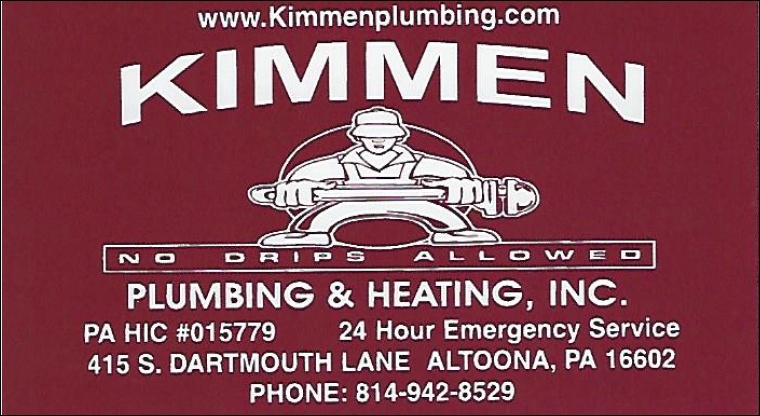
Cleaning & Servicing your HVAC Systems
Hire A Professional...Like Kimmen Plumbing & Heating, Inc.
Let Kimmen Plumbing & Heating's well-trained technicians perform regular maintenance on your
Air Conditioning systems.
Summer IS HERE finally!
You really should be thinking about cleaning and servicing your Air Conditioning system before you have
to turn it on, but it is never too late to have it serviced by our registered and licensed technicians. These cleanings are
typically performed when the outside temperature is above 50 degrees.
Kimmen Plumbing & Heating technicians will do these ten main points when cleaning your AC system.
1/ Check for the correct amount of refrigerant.
2/ Test for refrigerant leaks using a leak detector.
3/ Capture any refrigerant that must be evacuated from the system, instead of illegally releasing it to the atmosphere.
4/ Check for and seal duct leakage in central systems.
5/ Measure airflow through the evaporator coil.
6/ Verify the correct electric control sequence and make sure that the heating system and cooling system cannot operate simultaneously.
7/ Inspect electric terminals, clean and tighten connections, and apply a non-conductive coating if necessary.
8/ Oil motors and check belts for tightness and wear.
9/ Check the accuracy of the thermostat.
10/ Replace the filter.
The MOST important maintenance task that will ensure the efficiency of your air conditioner is to routinely replace or clean your filters. Clogged, dirty filters block normal airflow and reduce a system's efficiency significantly. With normal airflow obstruction, air that bypasses the filter may carry dirt directly into the evaporator coil and impair the coil's heat absorbing capacity. Replacing a dirty, clogged filter with a clean on can lower your air conditioner's energy consumption by 5% to 15%.
CALL US 814 942-8529 to have Kimmen Plumbing & Heating technicians change the filers and clean your furnace now to save energy consumption!
For central air conditioners, filters are generally located somewhere along the return duct's length. Common filter locations are in walls, ceilings, furnaces, or in the air conditioner itself. Room air conditioners have a filter mounted in the grill that faces into the room.
Some types of filters are reusable; others must be replaced. They are available a variety of types and efficiencies. Clean or replace your air conditioning system's filters every month or two during the cooling season. Filters may need more frequent attention if the air conditioner is in constant use, is subjected to dusty conditions, or you have fur-bearing pets in the house.
Air Conditioning Coils
The air conditioner's evaporator coil and condenser coil collect dirt over their months and years of service. A clean filter prevents the evaporator coil from soiling quickly. In time, however, the evaporator coil will still collect dirt. This drit reduces airflow and insulates the coil, reducing its ability to absorb heat. To avoid this problem, check your evaporator coil every year and clean it as necessary.
Outdoor condenser coils can also become very dirty if the outdoor environment is dusty or if there is foliage nearby. You can easily see the condenser coil and notice if dirt is collecting on its fins.
You should minimize dirt and debris near the condenser unit. Your dryer vents, falling leaves, and lawn mower are all potential sources of dirt and debris. Cleaning the area around the coil, removing any debris, and trimming foliage back at least 2 feet (0.6 Meters) allow for adequate airflow around the condenser.
Coil Fins
The aluminum fins on the evaporator and condenser coils are easily bent and block airflow through the coil. Kimmen Plumbing & Heating has a special tool called a fin comb that will comb these fins back into nearly original condition.
Condensate Drains
Clogged drain channels or condensate drains & lines, prevent a unit from reducing the humidity and the resulting excess moisture may discolor walls, carpet or flooring. Kimmen Plumbing & Heating can use a tool that resembles a stiff wire through the unit's drain channels to prevent this from happening.
 PA HIC# 015779
PA HIC# 015779